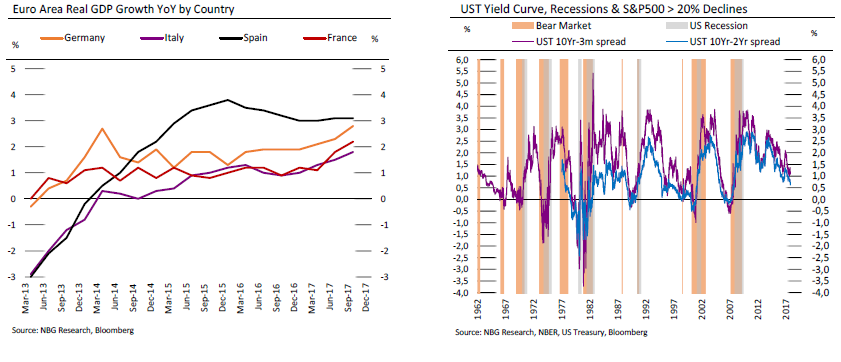Gregory Claeys, Maria Demertzis, (2017), “How should the European Central Bank ‘normalise’ its monetary policy?”, Bruegel, 23 November As the global financial crisis unfolded, the European Central Bank (ECB) and other central banks greatly extended their monetary policy toolboxes and adjusted their operational frameworks. These unconventional monetary policies have left central banks with large balance sheets.As growth picks up in the euro area, there are discussions about how to normalise …Read More
New eBook: Ordoliberalism: A German oddity?
Thorsten Beck, Hans‐Helmut Kotz, (2017), “New eBook: Ordoliberalism: A German oddity?”, VoxEU, 22 November The Eurozone crisis has opened fault lines between German economists and policymakers and those in a number of Eurozone (in particular periphery) countries.This column introduces a new eBook explaining the historical development of the ordoliberal school of economics and its influence on German policymaking, and contrasting it critically with what we like to call the Anglo-Saxon-Latin …Read More
Reforming the Eurozone: Structuring versus restructuring sovereign debts
Guido Tabellini, (2017), “Reforming the Eurozone: Structuring versus restructuring sovereign debts”, VoxEU, 23 Νovember In the debate on European reforms, a sovereign debt restructuring mechanism for the Eurozone is often proposed. This column argues that such a mechanism is not required. Instead, Eurozone member states should issue GDP-linked bonds, which would enact an implicit seniority structure on their sovereign debt and make the Eurozone more resilient to the next crisis. Relevant …Read More
The R&D Road to Development
Bjon Lomborg, (2017), “The R&D Road to Development”, Project Syndicate, 22 Νovember Research and development – into everything from cleaner ovens to preventing family violence – delivers some of the highest social benefits of any form of development intervention. Yet R&D is rarely the highest priority when development aid money is being allocated. Relevant Posts Manuel Muniz, (2017), «Economic Growth Is No Longer Enough», Project Syndicate, 25 October Ελένη Βαρβιτσιώτη, …Read More
US and euro area economic data are buoyant, albeit politics (US tax-plan, German coalition talks) remain a source of uncertainty for global assets
National Bank of Greece/Economic Research Division, (2017), “US and euro area economic data are buoyant, albeit politics (US tax-plan, German coalition talks) remain a source of uncertainty for global assets”, 21 Νovember The euro area economic recovery has shown signs of increasing synchronization, with French and Italian GDP growth both picking up (see graph). Politics continue to cause uncertainty in the euro area, with coalition talks breaking down in Germany, with …Read More
Leverage and limited liability: A toxic cocktail
Jean-Pierre Danthine, (2017), “Leverage and limited liability: A toxic cocktail”, 21 Νovember There is little debate that one of the main causes of the Global Crisis was excessive risk-taking by large international financial institutions. Most observers would also agree that much has been accomplished under Basel III to address the problem. Banks today are required to have more and better equity capital, they are required to prepare ‘recovery and resolution …Read More
ECB, Greece And The Ticking NPL Time-Bomb
Marcello Minenna, (2017), “ECB, Greece And The Ticking NPL Time-Bomb”, Social Europe, 22 November After the ECB regulatory tightening on banks’ non-performing loans (NPLs), announced with the well-known “addendum” to its guidance to banks of October 5, a barrage of anger came from the Italian banks and institutions (even the Minister of Economy Pier Carlo Padoan and the Bank of Italy took a stand) to defend the threatened stability of …Read More
The Twilight of Angela Merkel
Philippe Legrain, (2017), “The Twilight of Angela Merkel”, Project Syndicate, 21 Νovember While Angela Merkel’s departure may not be imminent, her power is leaching away. With Germany set to turn further inward as it struggles to form a new government – and possibly heads to another federal election next year – a hole has emerged at the heart of Europe, and France’s president, Emmanuel Macron, will not be able to …Read More
Has the Phillips curve disappeared?
Silvia Merler, (2017), “Has the Phillips curve disappeared?”, Bruegel, 21 Νovember The Economist argues that the Phillips curve may be broken for good, showing a chart of average inflation and cyclical unemployment for advanced economies, which has flattened over time (Figure 1). The Economist also refers to a recent paper by three economists at the Philadelphia Fed, arguing that the Phillips curve is not very useful at forecasting inflation: their …Read More
Dear EU: There’s More to Europe Than Paris and Amsterdam
Ferdinando Giugliano, (2017), “Dear EU: There’s More to Europe Than Paris and Amsterdam”, BloombergView, 22 Νovember Τhe European Banking Authority and the European Medical Agency will leave London and relocate, respectively, to Paris and Amsterdam. There was the usual ferocious lobbying, but ultimately the choice was open and transparent; it just wasn’t particularly clever. The EU could have been more strategic about its future. Relevant Posts Dirk Schoenmaker, Nicolas Veron, …Read More





